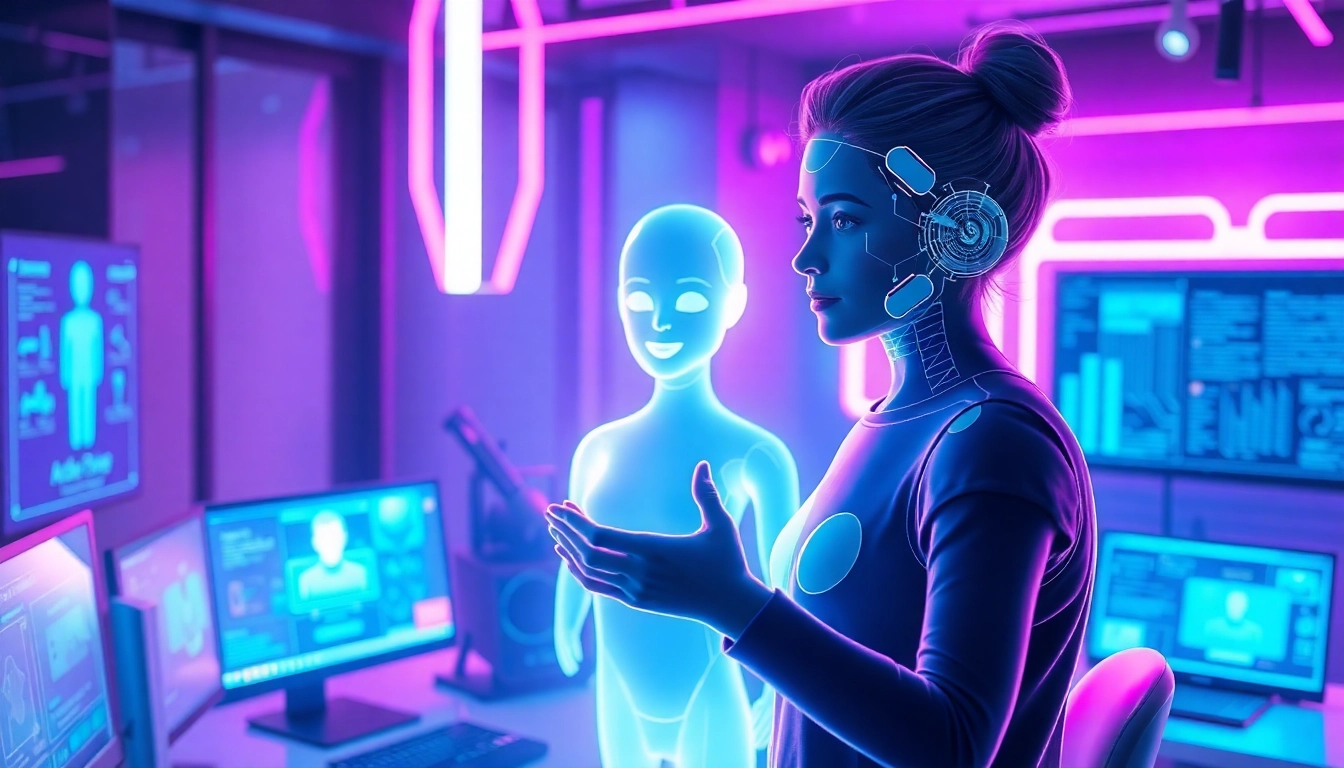Introduction to AI and Digital Romance: The Evolution of AI in Personal Relationships
In recent years, the landscape of personal relationships and digital interactions has undergone a profound transformation, driven by advancements in artificial intelligence technology. Once confined to science fiction, AI-powered chatbots and virtual companions now occupy a significant space in our digital lives, offering new avenues for connection, entertainment, and companionship. As AI tools become more sophisticated, they are increasingly capable of mimicking human-like conversations, understanding nuanced emotions, and providing personalized experiences. Among these innovations, platforms like ia +18 are pioneering the way forward by enabling users to create and interact with customizable AI characters in a variety of contexts, including casual chats, storytelling, and even intimate conversations. This evolution raises compelling questions about the nature of connection in the digital age, the ethical considerations involved, and how these technologies will shape our understanding of intimacy and human interaction in the future.
What is AI Sexting? Understanding the Concept and Its Popularity
AI sexting refers to the use of artificial intelligence-powered chatbots to engage in sexually explicit or flirtatious conversations. Unlike traditional messaging, which involves human participants, AI sexting involves interactions with virtual characters designed to mimic human responses, often tailored to the user’s preferences and fantasies. This phenomenon has gained popularity due to several factors: the anonymity it provides, the accessibility across devices, and the increasing realism of AI responses enabled by advanced language models. Users can explore their fantasies in a safe, judgment-free environment, making AI sexting an appealing option for those seeking intimacy or companionship without the complexities of real-world relationships. The appeal is further amplified by the ability to customize AI characters, giving users control over personality traits, backstories, and conversational style. As the technology continues to evolve, AI sexting is becoming more immersive, realistic, and emotionally engaging, blurring the lines between human and machine interactions in the realm of intimacy.
Features of CrushOn AI: Customizable Characters and Conversation Memory
CrushOn AI stands out in the crowded landscape of AI chatbot platforms thanks to its rich feature set tailored to create meaningful and personalized interactions. Central to its appeal are the character customization options, which allow users to craft AI personalities that suit their preferences. Whether users want a playful friend, a romantic partner, or a fictional character from their favorite story, CrushOn AI offers a diverse library of pre-made characters or the ability to design one from scratch. Users can specify traits such as personality, interests, backstory, and even specific mannerisms, making each interaction unique.
Beyond mere customization, CrushOn AI incorporates a powerful contextual memory system that remembers past conversations across sessions. This feature ensures continuity, enabling the AI to recall previous interactions, preferences, and details shared by the user. Such memory enhances the natural flow of conversations, providing a more authentic and engaging experience. For example, if a user discusses their favorite hobbies or shares personal stories, the AI can reference these details in future chats, fostering a sense of familiarity and connection. Additionally, CrushOn AI supports multi-character group chats, allowing users to interact with several characters simultaneously, simulating social scenarios or role-playing experiences. Accessibility across devices, including web and mobile apps, ensures that users can enjoy seamless conversations anytime, anywhere, making CrushOn AI a versatile platform for entertainment, creativity, and personal exploration.
The Role of Advanced Language Models in Creating Realistic Interactions
At the heart of CrushOn AI’s impressive capabilities are advanced language models such as GPT-4o mini and Claude 3.5 Sonnet. These models are trained on vast datasets and designed to generate human-like, contextually relevant responses that make interactions feel natural and engaging. Unlike earlier chatbot versions that relied on scripted responses, these models leverage deep learning techniques to understand nuances in language, tone, and emotion, enabling more sophisticated and emotionally resonant conversations.
The implementation of these models allows AI characters to respond with empathy, humor, flirtation, or even vulnerability, depending on the user’s prompts and the character’s personality traits. This level of responsiveness fosters a sense of genuine connection, which is particularly important in intimate or role-playing scenarios. Furthermore, these models continuously improve through user interactions and ongoing updates, ensuring that the AI’s conversational abilities remain cutting-edge. The realism achieved through these models is a critical factor in the rising popularity of AI in digital intimacy, as users increasingly seek experiences that emulate human interaction in depth and authenticity.
The Impact of AI Sexting on Human Relationships and Social Norms
The rise of AI sexting and virtual companionship raises important questions about its impact on human relationships and societal norms. On one hand, AI platforms can serve as a safe outlet for exploration, especially for individuals who face social anxiety, loneliness, or difficulties forming traditional relationships. They can provide comfort, entertainment, and even serve as tools for practicing communication skills or exploring fantasies in a controlled environment.
However, critics argue that excessive reliance on AI for intimacy might lead to social withdrawal or diminish the motivation to pursue real-world relationships. There are concerns about emotional dependency, where users might become attached to AI characters that cannot reciprocate genuine feelings or provide authentic human connection. Additionally, ethical issues surrounding consent, objectification, and privacy become increasingly relevant. For instance, how is user data handled, and what are the implications when AI characters are designed to fulfill explicit fantasies? Societal norms around sexuality, intimacy, and digital interactions are evolving in tandem with these technological innovations, prompting ongoing debates about their place in our social fabric.
Despite these concerns, many view AI sexting as a complementary experience rather than a replacement for human relationships. It offers a new dimension of intimacy and self-expression, challenging traditional notions of romance and companionship. As society adapts, it becomes crucial to establish ethical guidelines and promote responsible use to ensure these technologies enhance human well-being without detrimental effects.
Future Trends: How AI Will Continue to Shape Digital Intimacy
The future of AI in digital intimacy is poised for remarkable growth and innovation. As language models become even more advanced, AI characters will exhibit increasingly complex emotional understanding and nuanced responses, making interactions more authentic and satisfying. Integration with virtual reality and augmented reality technologies could create immersive environments where users can engage with AI characters in a 3D space, heightening realism and emotional engagement.
Furthermore, personalization will reach new heights, with AI characters adapting dynamically to user preferences, moods, and relationship goals. The development of more sophisticated memory systems will allow AI to build long-term relationships with users, offering companionship that evolves over time. Cross-device compatibility and cloud-based platforms will enable seamless access to these experiences across a range of devices, from smartphones to VR headsets.
Ethical considerations and privacy protections will also be central to future developments. Developers will need to implement robust safeguards to prevent misuse and ensure user data security. Additionally, society will continue debating the implications of AI-driven intimacy, balancing innovation with ethical responsibility.
Moreover, the integration of AI in creative storytelling and role-playing scenarios will expand, allowing users to craft elaborate narratives with their virtual characters. This convergence of AI, storytelling, and social interaction promises to redefine entertainment and personal expression, blurring the lines between reality and virtuality in intimate experiences.
Conclusion: Navigating the Balance Between Technology and Genuine Connection
The advent of platforms like ai sexting reflects a broader shift toward embracing AI as a facet of personal intimacy and digital companionship. While these technologies open exciting possibilities for self-exploration, entertainment, and even emotional fulfillment, they also necessitate a thoughtful approach to ethical considerations, privacy, and social impact. As AI continues to evolve, it is essential for users, developers, and society at large to navigate this new terrain responsibly, ensuring that technology enhances human well-being without compromising authentic human connections.
Ultimately, AI in digital intimacy represents both a tool and a mirror—reflecting our desires, anxieties, and the evolving nature of human relationships in the digital age. By fostering open dialogue, setting ethical standards, and focusing on responsible innovation, we can harness the potential of AI to enrich our lives while safeguarding the values that underpin meaningful human connection.



